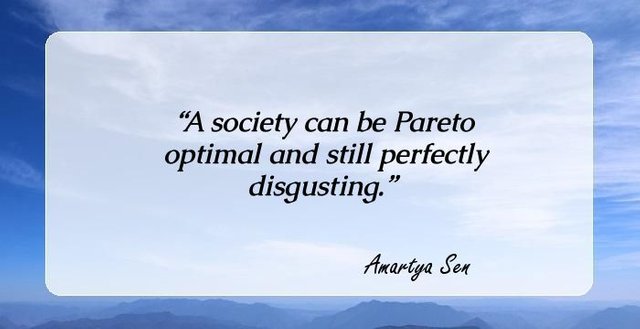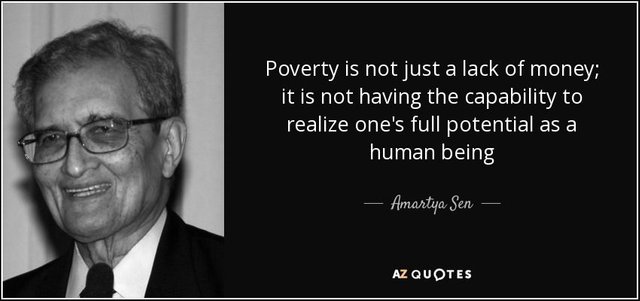Amartya Sen - economy for human development


Economic growth without investment in human development is unsustainable - and unethical - Amartya Sen
Human development, as an approach, is concerned with what I take to be the basic development idea: namely, advancing the richness of human life, rather than the richness of the economy in which human beings live, which is only a part of it - Amartya Sen
Any classification according to a singular identity polarizes people in a particular way, but if we take note of the fact that we have many different identities - related not just to religion but also to language, occupation and business, politics, class and poverty, and many others - we can see that the polarization of one can be resisted by a fuller picture. So knowledge and understanding are extremely important to fight against singular polarization. - Amartya Sen
https://en.m.wikipedia.org/wiki/Amartya_Sen
In 1981, Sen published Poverty and Famines: An Essay on Entitlement and Deprivation (1981), a book in which he argued that famine occurs not only from a lack of food, but from inequalities built into mechanisms for distributing food. Sen also argued that the Bengal famine was caused by an urban economic boom that raised food prices, thereby causing millions of rural workers to starve to death when their wages did not keep up.
Sen's interest in famine stemmed from personal experience. As a nine-year-old boy, he witnessed the Bengal famine of 1943, in which three million people perished. This staggering loss of life was unnecessary, Sen later concluded. He presents data that there was an adequate food supply in Bengal at the time, but particular groups of people including rural landless labourers and urban service providers like haircutters did not have the means to buy food as its price rose rapidly due to factors that include British military acquisition, panic buying, hoarding, and price gouging, all connected to the war in the region. In Poverty and Famines, Sen revealed that in many cases of famine, food supplies were not significantly reduced. In Bengal, for example, food production, while down on the previous year, was higher than in previous non-famine years. Thus, Sen points to a number of social and economic factors, such as declining wages, unemployment, rising food prices, and poor food-distribution, which led to starvation. His capabilities approach focuses on positive freedom, a person's actual ability to be or do something, rather than on negative freedom approaches, which are common in economics and simply focuses on non-interference. In the Bengal famine, rural laborers' negative freedom to buy food was not affected. However, they still starved because they were not positively free to do anything, they did not have the functioning of nourishment, nor the capability to escape morbidity.
http://pratclif.com/economy/amartya-sen.htm
A perusal of professional economics journals today would make it difficult to appreciate the long and rich connection between economic discourse and moral philosophy. Adam Smith is usually credited with founding the discipline of economics in his remarkable Wealth of Nations, published in 1776. The book persuasively sketched the general equilibrium characteristics of a market economy, showing that pursuit of private gain can be socially productive under conditions of competition. But Smith was also a professor of moral philosophy at Glasgow University whose publications included The Theory of Moral Sentiments. In fact, most of the celebrated nineteenth-century economists, from Thomas Malthus through David Ricardo and John Stuart Mill to Francis Edgeworth and Alfred Marshall, took moral considerations seriously and made important contributions to the subject.
Most economists these days eschew moral philosophy -- namely, the consideration of social justice -- because they consider it too "soft" for rigorous analytical treatment. But Amartya Sen harks back to the older and richer tradition of evaluating the considerations of economic efficiency -- which dominate most modern economic analyses -- with respect to their general social consequences. Such judgments require an ethical framework.
Development as Freedom attempts to map out Sen's thoughts on economic development for a broad, nonspecialist audience, drawing extensively on his more technical work as well as that of others. Although the book avoids jargon, it is closely argued and requires attentive reading, despite the many repetitions and recapitulations. Its central idea is relatively straightforward, even though it radically recasts how concerned individuals should think about economic development -- not only professional economists but also development planners, public officials in developing countries, aid agency workers, international civil servants, and members of the general public, insofar as they think about economic development at all.
Amartya sen is probably among my favorite economist, as he take a deeper perspective on what is the true goal of economic growth, beyond only stock market value, and financial gain.
According to him, economic growth is about ability to make the world a better place, and favorizing human development, as capacity for everyone to increase his own well being, and realize its own potential, instead of just reading economy as evolution of a chart that monitor financial profits.
http://www.equilibrium-economicum.net/amartyasen.html
My readers may recall that a year ago I quoted two present-day English writers, according to whom most economists deny that justice has any bearing on economic transactions.3 More than a century ago, the French historians Gide and Rist blamed three of the founding fathers of 'classical' economics: Adam Smith, Jean-Baptiste Say and David Ricardo consider that man is motivated only by his own interests. They imagine him totally absorbed in the pursuit of gain.4 That is less than fair to Smith, who was in fact far more concerned with the morality and humanity of economic behaviour than is generally acknowledged. But posterity has neglected this aspect of Smith's thought, preferring to focus its attention on the 'invisible hand', whose infallibility was never claimed by Smith himself. As Sen observes, while some men are born small and some achieve smallness, it is clear that Adam Smith has had much smallness thrust upon him.
_Thus, even from its early days, economics has all too often been blind to the moral implications of its theories and policies. It has based itself largely on three assumptions: _
(a) that human beings are primarily concerned with rational action designed to maximise their personal economic gains; that other motivations, leading to altruistic or non-rational actions, are of minor importance and can be ignored;
(b) that individual self-interested actions, carried out in the freest possible markets, are normally (not merely 'frequently', as Smith put it,6) conducive to the general good;
(c) that the sole purpose of economic activity is to maximise the output of consumer goods and services with minimum input of human labour.
Sen, by contrast, is one of the rather few modern economists who have striven to involve economics with morality and justice, not merely with how to maximise capitalist wealth and consumer-pampering efficiency. In his view, there are two contrasting approaches to economics. There is the 'ethical' approach which considers how to manage the economy so as to deliver 'economic justice', an acceptable distribution of available resources. And there is the 'engineering' approach, which considers how to generate goods and services as efficiently and profitably as possible. Sen accepts that both are necessary, but he deplores the inordinate dominance of economic 'engineers' in the Western world ever since the eighteenth century.